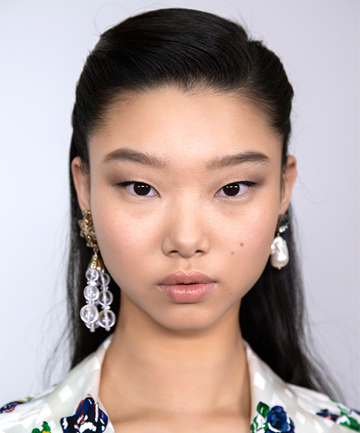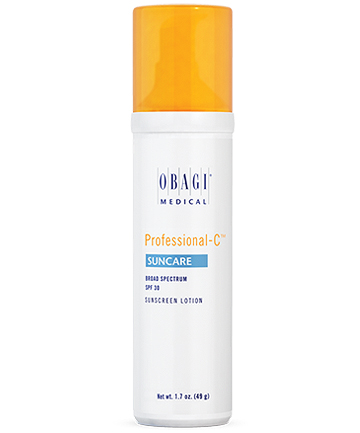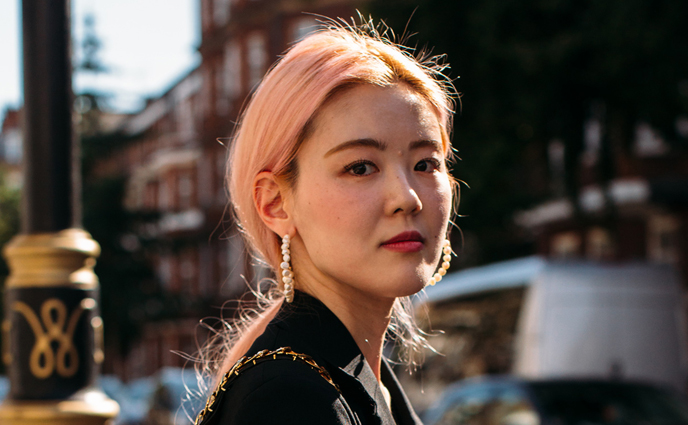Some skin care pairings go together as well as bread and butter, pie and ice cream, avocados and brunch. (You get the idea.) Then, there are some ingredients that definitely should not be mixed.
So, what about sunscreen and vitamin C? You've probably heard that the combination works well in tandem to protect your skin from the sun. And given the sun's damaging rays, any extra bit of help is most welcome.
But is that really true? We asked the experts to see whether sunscreen and vitamin C are really the dream team.
Image via Imaxtree
All of the experts interviewed gave a resounding "yes" that vitamin C can boost the power of sunscreen. "Vitamin C is one of our best known and most powerful antioxidants that helps repair free radicals created from sun and environmental damage," says Dr. Naissan O. Wesley, board-certified dermatologist. "Since sunscreen is helping us prevent UV damage, in helping repair UV-induced damage, vitamin C is helping our sunscreen and sun protection work better."
Pairing sunscreen and vitamin C is a double win because the combo can help repair and reverse sun damage at the same time it's working to protect. This is extremely important because Wesley says that the more cumulative UV damage that occurs to skin over our lifetimes, the more difficult it is to reverse.
Founder of Protocol Tyler Gaul cites a clinical study that shows 10 percent ascorbic acid (vitamin C) topically applied under sunscreen has been found to reduce the occurrence of sun damage by between 40 and 60 percent. "This is because ascorbic acid combats free radicals (mainly unstable oxygen atoms) produced by UV exposure," says Gaul.
Sunscreen protects skin by reflecting or absorbing some of the sun's UV rays, according to board-certified dermatologist and Lycored ambassador Dr. Amanda Doyle. (Physical-blocking sunscreens, like zinc oxide or titanium dioxide-based formulas reflect, while chemical formulas absorb.)
Your topical vitamin C essentially acts as another barrier against sun damage by fighting UV-induced free radical damage. This maintains the integrity of skin's cells, which gives it anti-aging and anti-inflammatory benefits, reports Doyle.
One note: Layering skin care products correctly is important to ensure their full benefits. Gerald Imber, MD, NYC plastic surgeon and founder of Youth Corridor Skincare, says that your vitamin C needs to go on before your moisturizer or SPF; otherwise it won't be able to be absorbed and will therefore be "useless."
Image via Imaxtree
To go along with being another barrier against sun damage, vitamin C aids in the prevention of redness, aging and the formation of brown spots — provided it is applied prior to sun exposure, reports Doyle.
Similarly, topical vitamin C has been shown to help improve hyperpigmentation by inhibiting melanin formation, according to David Lortscher, board-certified dermatologist and CEO of Curology. It also may help with rebuilding skin's structure by stimulating collagen production, thus reducing fine lines and wrinkles.
To be clear, though vitamin C is a superpower antioxidant, it is not a replacement for sunscreen. For example, Dr. Robyn Gmyrek MD, board-certified dermatologist at Park View Laser Dermatology, specifically tested the SkinCeuticals C E Ferulic with 15% L-Ascorbic Acid, $166. It showed that the vitamin C provided a SPF of 8 after four applications and with continued use.
"This level of protection is helpful but is not nearly enough sun protection," she says. (And the same may not even be true about other vitamin C products.)
Gmyrek continues, "To truly protect yourself from the harmful rays of the sun, SPF 30 or more is needed to protect yourself from ultraviolet B rays." Additionally, the sunscreen must be labelled "broad spectrum" protection to ensure you're getting protection from ultraviolet A rays (UVA) and ultraviolet B rays (UVB).
Having protection from UVA rays is critical because they penetrate even deeper than UVB rays. UVA rays can go through window glass and they contribute to premature skin aging and skin cancer, according to Gmyrek. UVB rays are the ones we most strongly associate with the sun because they burn skin.
Bottom line: "It's important to remember that vitamin C should not replace your sunscreen, but rather provides additional protection for your skin against ultraviolet damage when added to your regimen," says Lortscher.









